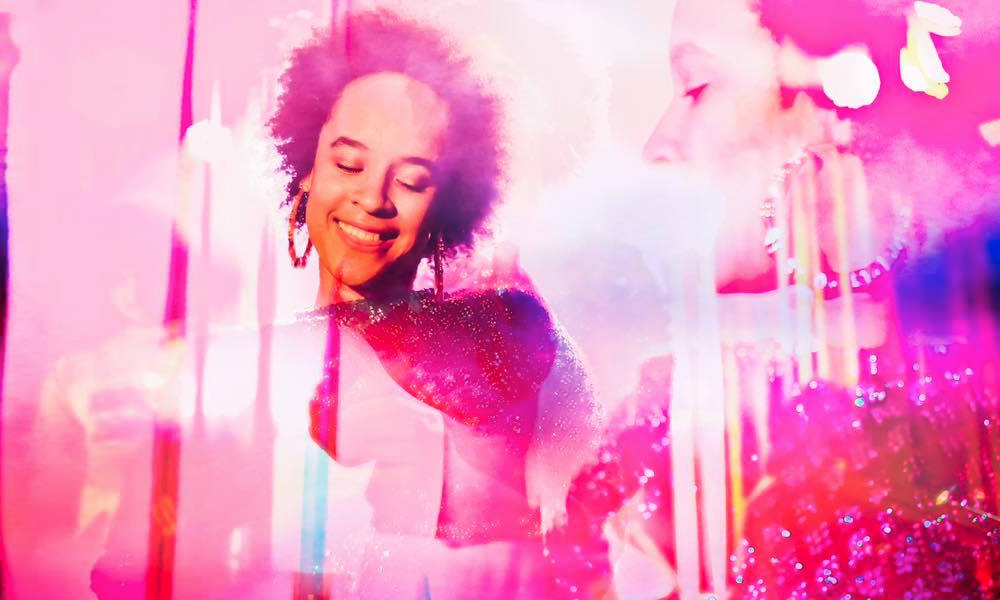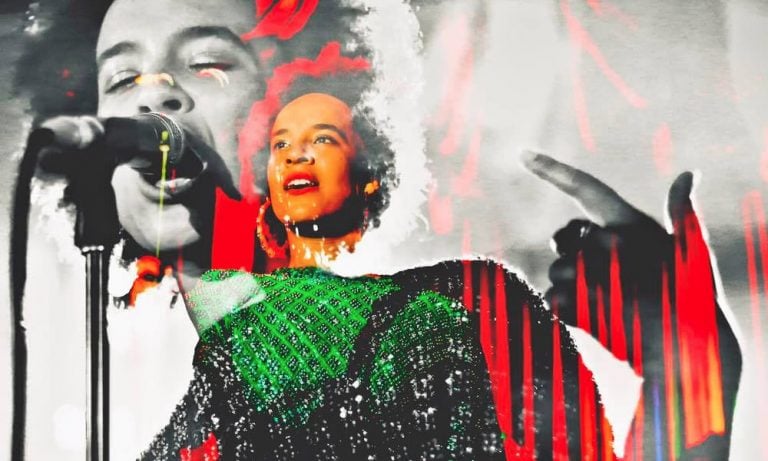Melbourne outfit Saskwatch have just released their anticipated fourth album Manual Override, the first they’ve mixed and co-produced themselves, and released independently.
Their move towards independence is a step the band have only been able to take thanks to building a certain amount of confidence in themselves, but it turns out that this newfound self-belief runs deeper than what happens in the studio.
When she’s not fronting the band, singer N’Kechi Anele runs a community called The Pin, which focuses on the issues Australia faces with cultural diversity. As a biracial Australian, she’s dealt with her own personal struggles with identity and acceptance, and become well-acquainted with the prejudices that still run deeply through our country.
We’ve spoken with N’Kechi about her work with The Pin, her thoughts on Australia’s issues with race, and how accepting herself and her racial identity has helped her when it comes time to play music.

When she’s not releasing brilliant records with Saskwatch, N’Kechi is helping others feel accepted
Tackling cultural issues in Australia
So you’re the founder of the beautiful website ‘The Pin’, which deals with race, identity and culture in Australia. Why do you think it’s such an important issue to talk about, not only in music, but across the whole of Australia?
Love Music?
Get your daily dose of metal, rock, indie, pop, and everything else in between.
I think it’s important because of how heavily we rely on technology, and how the internet has made us a very global society, so it’s giving a lot of people with voices who haven’t been heard for a really long time a platform to be heard, and to be louder, and to be recognised, and not be quieted by other things that are going on in Australia.
Australia has a real issue with its identity because of our ability to pretend that our history doesn’t exist
I also think it’s just the effect of globalisation – everyone’s moving and the world seems like it’s getting smaller somewhat with the ease in which we travel, and obviously as a byproduct of that you’re going to get people like me who are biracial. Australia has a real issue with its identity because of our ability to pretend that our history doesn’t exist, and to not relate to it or take any responsibility for it, because we feel that we’re too many generations away from it when realistically we’re not.
There’s a lot of stuff that’s still going on that it makes it extremely hard – the ideas around ‘what is Australian identity?’ are so fleeting, but at the same time because of that, people who are in the majority of the population are quite… I don’t know how to say this… They’re scared, so they get very aggressive.
I don’t know the right way to say it, but they get a bit hostile when it comes to Australian identity. So if you don’t look like what the general population of Australia looks like, people will be quite hostile, and when you don’t conform to the way people think that you should act as well, that’s a really big thing.
If you don’t look like what the general population of Australia looks like, people will be quite hostile
For me personally, the reason why I think it’s important is because growing up I didn’t have that medium. I grew up with that Africaness from one parent – an idea of blackness from African American culture and not Australian culture – and I didn’t relate to either of them that strongly, and I felt very odd because of it.
It took until my twenties, until I was in Saskwatch – hanging out with musicians, and meeting other people that looked like me, that liked the same things as me – that I felt much more secure in who I was and in my own identity.

Saskwatch photos by Lisa Businovski
My friend Lucy Cutting who I created this with, we both met each other in our twenties and found out that we had a similar background, and through our experience of having a friendship like that with somebody, we were like, ‘Oh my god, is this what everybody else goes through?’
We don’t have to explain hair things, or why our skin is a different colour to everybody else’s skin, and so we wanted to make sure that there was a platform out there for people – younger, or older; isolated, or in big communities – that they could go and look at, to find people with the same opinions as them.
Being in a minority and speaking in public, a lot of people perceive your view to be the view of everybody that looks like you
Because the other thing is, being in a minority and speaking in public, a lot of people perceive your view to be the view of everybody that looks like you. So we also wanted to show that there were people that look the same, but might not have anything genetically related to each other; or are the same, but don’t even think the same way about how they see themselves or how they society, and that that’s okay.
That’s the whole point of The Pin… which is to say, we’re kind of this weird third culture of people who belong to everything and nothing at the same time, and we’re awesome, so deal with it! (laughs)
Embracing cultural identity as a performer
Last night and the night before was the first time where I’ve really been in the front of Saskwatch with my hair actually out in its natural state. I think the biggest impact of me starting this site was realising that I didn’t necessarily have any hang ups about being black – I don’t hate being black, I love it – but I wanted to have my hair look as neutral as possible. Because to me, that’s probably the thing people identify the most with feeling ‘foreign’, because my hair is so foreign to everyone else.
I wanted to have my hair look as neutral as possible, because that’s probably the thing people identify the most with feeling ‘foreign’
Being in the site and meeting all these people… you’d think they would be angry at the experiences they’ve had, but just like loving themselves and the lives that they are living, which just made me feel a lot more comfortable with being myself, and not feel like people were staring. I think that’s the other thing: you think that people are always like staring, and it’s not just about looking different. Everyone feels like people are going to be looking at them if they do something different, and the reality is that we’re all just worrying about ourselves.
Being able to take my hair out, and feeling very comfortable with that and actually liking it… I’ve tried it before and I’ve hated it, and I got so depressed, I was like, ‘I’m putting this away’. So this has actually been the first time that I’ve felt really confident with having my hair out, and not worrying about how it was going to be perceived or if it changed people’s minds about me. Which sounds really ridiculous, but…
Saskwatch’s fourth album Manual Override is out now, and you can grab a physical or digital copy here. You can also catch them playing their 14-date national tour throughout October and November, dates below.
Saskwatch Manual Override album tour
Fri 6 Oct – Rollercoaster (Previously Players Bar), Mandurah
Sat 7 Oct – Mojos, Fremantle
Thu 12 Oct – Karova Lounge, Ballarat
Fri 13 Oct – Republic Bar, Hobart
Sat 14 Oct – Barwon Club, Geelong
Sat 21 Oct – Corner Hotel, Melbourne
Thu 26 Oct – Strawberry Boogie, Wollongong
Fri 27 Oct – Oxford Art Factory, Sydney
Sat 28 Oct – The Small Ballroom, Newcastle
Sun 29 Oct – Long Jetty Hotel, Long Jetty
Thu 2 Nov – Miami Marketta, Gold Coast
Fri 3 Nov – The Triffid, Brisbane
Sat 4 Nov – Byron Bay Brewery, Byron Bay
Sat 18 Nov – Fat Controller, Adelaide

































